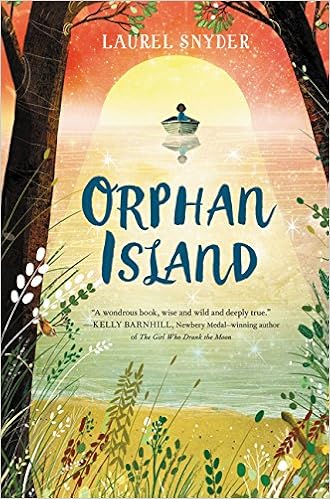In Orphan Island, Laurel Snyder has woven together an intriguing mixture of unique characters, Utopian setting, and unanswered questions. The result is captivating, thought provoking, and you should read it. Without being didactic, it teaches its lesson well: Sometimes you have to obey the rules even if you don't know why. Sometimes you have to work with and care for people you don't even like. Sometimes you have to move on and leave behind the things you love even if you try your hardest to hang on. And you won't ever know all the "why's", but someday you'll see enough to be okay with it.
Orphan Island is a kind of coming-of-age story. It's a fairly simple setup. There's an island with only 9 orphans. Every year (approximately) a boat comes bringing one more child--the new youngest, and immediately taking one away--the oldest. The one who comes is the Elder's (the new oldest's) Care, which essentially means that in the intervening time before the Elder steps into the next boat, he or she has to teach their Care the ways of the island--what's safe and what's not, but always including the three essentials: how to swim, how to read, and how to cook. At the same time, the Elder is responsible for teaching the Elder-in-training about what to do with their Care with the boat comes again.
We're introduced to our protagonist, Jinny, right as she becomes the new Elder. She watches her best friend, Deen, step into the boat. Simultaneously, she loses her best friend and comfort and receives responsiblility for a snot-nosed, whimpering toddler, who declares her name is "Ess." Jinny does less than a stellar job through her year as Elder. She loves Ess very much, but Jinny struggles with following the rules that were laid out on the island, passed down for who knows how many years..... and we always come back to "why?" Why are these nine children on an island? Are they truly orphans? When did the whole thing start? Why only nine and no more? Why do they always have to be the same ages, leaving at a certain point to be replaced with another youngster? Why. . . ? When. . . ? Who. . . ?
Jinny has her fill of questions, frustrations, and doubts, and when it comes time for her to step in that boat and ride away from the only life she's known to.... who knows where... she rebels. She pulls the boat up on the beach, and for the second half of the story, it's an experiment in what happens when one person decides that she doesn't have to follow the rules. And the story is set up to show--to prove, in fact, that no human being has the ability to just stay where they are. Time keeps moving forward, and children keep growing up. And even when people try to hang on too long, it affects and warps the relationships all around them. No one can just make decisions without them affecting other people. Each of the other children on the island has their own jobs and personalities, and it's peaceful and harmonious while Jinny is operating within the normal setup of the island. But as soon as she goes off the book, each of those relationships changes in a significant way.
In the afterward, Laurel Snyder admits to writing a back story, a preface that was deleted from the final printed copy. So there is an explanation for many of the questions we're left with. But--oh so true to life--we don't actually get to know what it is. This is the point of the story. We don't get to know everything. We don't get to have everything explained. And yet the world is still SO beautiful. Do we need to have everything explained to enjoy it and love it the way that it is? Can we not just trust that the rules are there for a reason and follow them, and encourage others to follow them because life is good that way? My 12-year-old self would have both loved and hated this book.... it summons courage for those fearful of a new stage in life, which I certainly needed and would have appreciated. But as always, I would have hated the teaching that "the rules" apply to everyone, including me. I, like Jinny, prefer to decide on my own what to do.... but also like Jinny, I've learned that life isn't about what I want. It's about obligations and duty, other people, finding and relishing the delight around us, cultivating the world and ourselves to be more than we were (and in my version) to the glory of God!
This is a great book. I'll be reading it again, and in about 5 years, my own kids will start reading it.... hopefully, by then, I'll have reconciled myself to them entering a more complicated world outside their homey and childish pursuits.

No comments:
Post a Comment